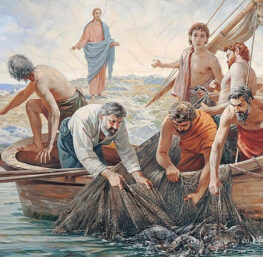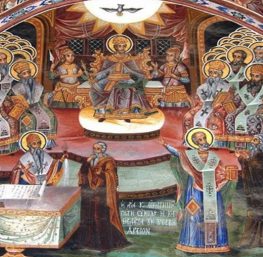Another “living fossil” discovery pokes holes in the secular Macro Evolutionary theory.
AP | Ali Sultan | July 16, 2007

ZANZIBAR, Tanzania – Fishermen have caught a rare and endangered fish, the coelacanth, off the coast of the Indian Ocean archipelago of Zanzibar, a researcher said on Monday.
The find makes Zanzibar the third place in Tanzania where fishermen have caught the coelacanth, a heavy-bodied, many-finned fish with a three-lobed tail that was thought extinct until it was caught in 1938 off the coast of South Africa. Since then two types of coelacanth have been caught in five other countries: Comoros, Indonesia, Kenya, Madagascar and Mozambique, according to African Coelacanth Ecosystem Program.
“Fishermen informed us that they caught a strange fish in their nets. We rushed to Nungwi (the northern reaches of Zanzibar) to find it’s a coelacanth, a rare fish thought to have become extinct when it disappeared from fossil records 80 million years ago,” said Nariman Jiddawi of the Institute of Marine Sciences, which is part of the University of Dar es Salaam in Tanzania’s commercial capital.
. . . more




Tom says:
Way, way back in this thread I claimed that people confuse evolution and darwinism, when they are not in fact the same thing.
This may be true, however I don’t think you give enough credit to just how intertwined evolution (separated from darwinism) is with philosophical naturalism, neo-Epicureanism, etc. I have never met a theory of evolution that did not rest on atomistic grounds. Even the sophisticated “theistic evolution” that I have read about ends up firmly in the neo-Epicurean camp when it comes to significant things, like what is a “person”, morality, etc. In other words, while it makes pains to separate itself from darwinism, it still carries the same fundamental baggage.
The pope has no problem with evolution; he has a big problem with darwinism.
I have heard this, but never made a study of it. Chesterton said something similar, but then he understood the ramifications of ALL evolutionary theory (at least of his day) and how it ended up, which is why he in the end rejected it.
Perhaps the pope SHOULD have a problem with evolution…;)
JBL, you say back up the thread a bit:
Could you expand?
#152
Christopher, Pelikan advocated the idea of ecumenism. His move from a conservative Lutheran synod to a more open Lutheran synod was predicated primarily on ecumenism.
When that other Lutheran synod became to open (that they lost any theological sense) Pelikan was theologically forced to find a new home. His studies in early church history leaned him more toward Orthodoxy. But also Orthodoxy still offered him a place to allow him to continue to hold to ecumenism, because of Orthodoxy’s support and participation in Interfaith movements. Pelikan’s not alone in this journey there were many theologians that went a similar route, but instead of moving toward Orthodoxy they went with the magisterium of Rome.
The clue to Pelikan’s holding of ecumenism can be found in his festschrift “The Unbound Community: Papers in Christian Ecumenism in honor of Jaroslav Pelikan.”